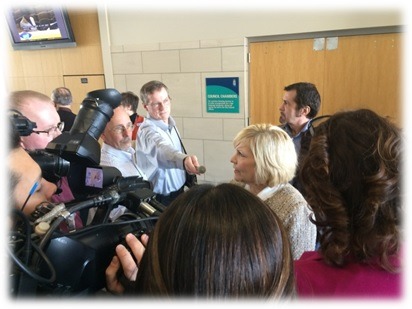 Before Mike Stern rejoined Jacobs Media, he was doing a considerable amount of work coaching talent. Since coming back onboard, Mike now works with a number of personalities, enjoying the challenge of watching radio shows grow their brand and market influence. Today’s guest post is a great success story in a market that might seem unlikely.
Before Mike Stern rejoined Jacobs Media, he was doing a considerable amount of work coaching talent. Since coming back onboard, Mike now works with a number of personalities, enjoying the challenge of watching radio shows grow their brand and market influence. Today’s guest post is a great success story in a market that might seem unlikely.
And yet, it underscores the ability of radio hosts to have impact anywhere there’s a microphone, a transmitter, a tower, and a community that is ready to be inspired. I can guarantee you this – the next time any of us flies into Wichita, we’ll be thinking about the show and the station Mike talks about in this post. – FJ
When I first met Jan Harrison and Phil Thompson, the morning team at 104.5 – The Fox (Journal’s Classic Rock station in Wichita), we discussed two goals.
The first was being the most local show we could be. In a market with Elvis Duran, Bobby Bones, Todd and Tyler and other “nationalized” shows, we needed to accentuate our difference – being an integral part of the local community.
The second was how to market the show. We knew there weren’t going to be any billboards or television spots in the near future. So the challenge was finding ways to get exposure for the show beyond our existing cume using viral, word of mouth, or anything that didn’t cost money.
Not for one second did I ever imagine that the result of the conversation would be renaming the Wichita airport.
 A few weeks later, Jan and Phil laid out their idea. Wichita is in the process of building a new terminal for their airport that will be much nicer than what’s currently there. The aviation industry has been a big part of the Wichita economy with several major airplane manufacturers having offices in town.
A few weeks later, Jan and Phil laid out their idea. Wichita is in the process of building a new terminal for their airport that will be much nicer than what’s currently there. The aviation industry has been a big part of the Wichita economy with several major airplane manufacturers having offices in town.
But the name “Mid-Continent Airport” was at best forgettable, and at worst spurred images of bladder control issues. Jan and Phil’s concept was to start a grassroots campaign to rename the airport in honor of President Dwight D. Eisenhower who grew up not far from Wichita and has not had any major public facilities named in his memory.
It began with an online petition which they talked about on the morning show. The station used all available channels to promote the effort through the day on the air, on their website, and though social media. A press release about the movement garnered some local TV coverage so if nothing else happened, they were making progress.
The petition eventually garnered more than 1,500 signatures. And in addition to the on-air push, the team was working behind the scenes. They did research into the legalities of the idea, talked to representatives from other airports that had recently changed names, and tried to rally support. They got former Senator Bob Dole, who had attempted to have the Houston airport named after Eisenhower, to write a letter of support and talked to representatives of the Eisenhower family’s foundation who said they would welcome the honor.
 Eventually, Jan (pictured left) presented the petition to the Wichita City Council who agreed to form a naming committee to explore the idea (which led to even more press coverage). Jan, who was named to the committee, continued to push the idea forward. On March 4, almost seven months to the day after launching the petition, the Wichita City Council approving the measure by a vote of 5-2.
Eventually, Jan (pictured left) presented the petition to the Wichita City Council who agreed to form a naming committee to explore the idea (which led to even more press coverage). Jan, who was named to the committee, continued to push the idea forward. On March 4, almost seven months to the day after launching the petition, the Wichita City Council approving the measure by a vote of 5-2.
This, of course, garnered even more widespread press attention. You can see one of the stories here and if you look closely at the B-roll you may notice Journal execs Beverlee Brannigan and Steve Wexler picking up their luggage – a strange but happy coincidence.
There are several morals to this story for radio stations, programmers, and hosts.
The first is that not all issues or movements have to be born out of anger. The idea of renaming the airport is a fairly non-controversial concept. As Jan Harrison said when she presented the idea to the Council, issues that make people mad probably garner more signatures than this campaign generated, but that didn’t make this idea any less important.
Second, this campaign proves that it’s possible for stations to get attention for doing something positive and real in their city. Hosts don’t have to sit on billboards or lead outlandish, potentially dangerous stunts to garner press coverage and reach new audience. Not only did the station generate television and newspaper coverage but there were also letters to the editor in the Sunday paper and meetings with politicians and local business people, all of which also helped raise the level of awareness for the show and the station. This campaign truly helped build and strengthen a local radio brand.
Third, getting this kind of attention doesn’t have to cost a ton. The entire budget for this campaign was about $60 spent to make buttons that say “I Like Ike.”
Fourth, this campaign shows that anything is possible. If you don’t ask, you don’t get. And in this case, Jan and Phil started something that had poor chances of success at the outset. But they saw it through, went through the hoops, and got it done.
Finally, this airport renaming project proves that local radio matters and can make a difference. You can take all your RADAR numbers and metrics and shove them in a carry-on bag. A campaign like this is proof positive that radio is a powerful medium. This couldn’t have been done by an iPod, a pure-play algorithm jukebox, or by satellite radio.
Unlike a lot of other radio ideas, this can’t just be cloned and rolled out in other markets. Not every city has an airport that could use a new name. But the idea of looking around your community, finding something you are passionate about and doing the work to make it happen is universal. And as you saw, it can have benefits that stretch far beyond searching the web for another weird news story to read.
I for one can’t wait until the day I make a market visit to Wichita and fly in to Dwight D. Eisenhower National Airport. Congratulations, Jan and Phil, to the Fox staff, and Journal for once again proving the power of local radio.
- What To Do If Your Radio Station Goes Through A Midlife Crisis - April 25, 2025
- A 2020 Lesson?It Could All Be Gone In A Flash - April 24, 2025
- How AI Can Give Radio Personalities More…PERSONALITY - April 23, 2025




Leave a Reply